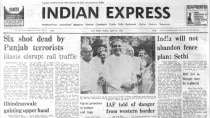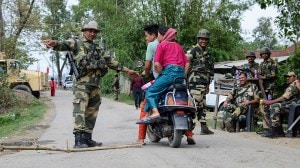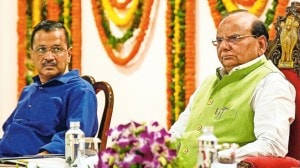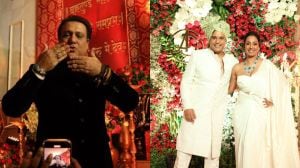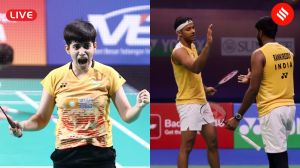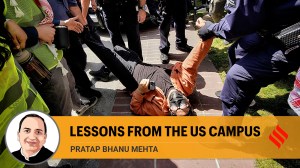- India
- International
For half a century, Parliament’s Central Hall has been a turf for MPs and scribes to exchange views
For over half a century, Central Hall has served as a convenient neutral turf for government and opposition leaders and journalists to informally exchange news and views.
 Since the start of the Modi 2.0 government, there have been vague hints that the media might be barred from Central Hall. (File)
Since the start of the Modi 2.0 government, there have been vague hints that the media might be barred from Central Hall. (File)
Parliament’s Central Hall is not simply the large hall where both Lok Sabha and Rajya Sabha members attend joint sessions twice annually. Through most of the year, it is a meeting place for MPs, past and present, and senior journalists to exchange notes over coffee, tea and snacks, between attending sessions in the House. For over half a century, Central Hall has served as a convenient neutral turf for government and opposition leaders and journalists to informally exchange news and views. That way the media gets a better understanding of the thinking of parties and government and vice versa. However, since the start of the Modi 2.0 government, there have been vague hints that the media might be barred from Central Hall. Speaker Om Birla assured a journalist that there was no such move. But a comment last week at The Indian Express Idea Exchange by Bimal Patel, the architect chosen to draw up plans for a restructure of the Central Vista, including Parliament, has set alarm bells ringing. Patel remarked that when he showed his blue print for the three halls of Parliament to Prime Minister Narendra Modi, he suggested that there was no need for the joint session hall. A hall for the Lok Sabha to accommodate a joint session, and another for the Rajya Sabha was sufficient.
Homeward Outlook
In Modi 1.0, the powerful National Security Advisor Ajit Doval was perceived as encroaching on the turf of the Home and External Affairs Ministries. But in Modi 2.0, Doval does not pose any threat. The unquestioned power centre is the Home Ministry, where Amit Shah presides unchallenged. During the recent two-day tour of 15 foreign envoys to Kashmir, Doval, who initiated the visit, and the MEA officials who should normally have been in charge were overshadowed by the Home Ministry. The MEA is keen to counter international criticism over conditions in Kashmir, but Shah is not overly perturbed since he views such perceptions as fuelled by a lobby of habitual anti-India baiters. Even foreign envoys in India are conscious of the importance of Shah. Several senior diplomats have sought an appointment with the Home Minister. Shah has declined all requests. He agreed only to grant an appointment to the representative of a friendly island nation, since he felt the man was a kindred spirit. However, the MEA advised against the meeting, since it would be perceived as a snub to other envoys.
Intelligent Swipes
The cold vibes between Madhya Pradesh Chief Minister Kamal Nath and Congress Rajya Sabha MP Jairam Ramesh were evident at a recent book festival in Bhopal. Nath was chief guest and Ramesh was on the dais as the author of a book on Jawaharlal Nehru and V K Krishna Menon. Introducing Nath, Ramesh commented tongue in-cheek that when he worked under Nath as Minister of State in the Commerce Ministry, Nath was so “super intelligent”, he didn’t feel the need to allocate any work to his junior. Nath retorted that Ramesh was so “super intellectual”, he didn’t need any mundane ministry work. While Nath was Ramesh’s boss in Manmohan Singh’s first government, later Ramesh became a Cabinet minister and exerted greater clout in the party because of his proximity to Rahul Gandhi.
Lock Them Up
Transport Minister Nitin Gadkari does not hide his frustration with obstructionist bureaucrats. Infuriated with the slow pace of a file from the desk of a director-level officer to a joint secretary, additional secretary and secretary, the plain-speaking Gadkari threatened his officers that he would lock them all up in a room until they worked out a solution. Last week, at a road safety meeting in Delhi, Gadkari warned that “dead assets in government, who neither take decisions nor allow others to work, would be shown the door’’. While such a drastic step may not yet be imminent, it is learnt that there is a proposal to reduce the retirement age of Central government officers from 60 years to either 55 or 58 years. An alternative suggestion is that no officer should be allowed more than 30 or 33 years of service.
Film Scrapped
Before she passed away, the late Sushma Swaraj wanted to make a documentary on ‘A Day in the Life of an MEA Officer’. In the proposed feature, the articulate Swaraj was filmed expounding on what a job in the Foreign Office entailed. After Swaraj’s untimely death, it was decided that the focus of the film would be changed, the footage re-worked and some additional shots added so that it would be a fitting cinematic tribute to Swaraj. But strangely, the powers-that-be changed their minds and the documentary was simply scrapped.
EXPRESS OPINION
More Explained
Apr 27: Latest News
- 01
- 02
- 03
- 04
- 05











